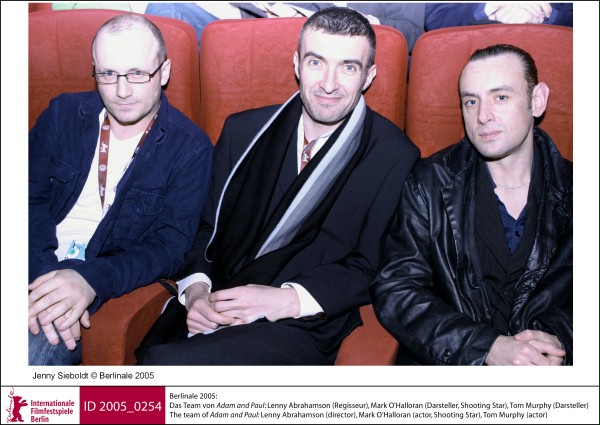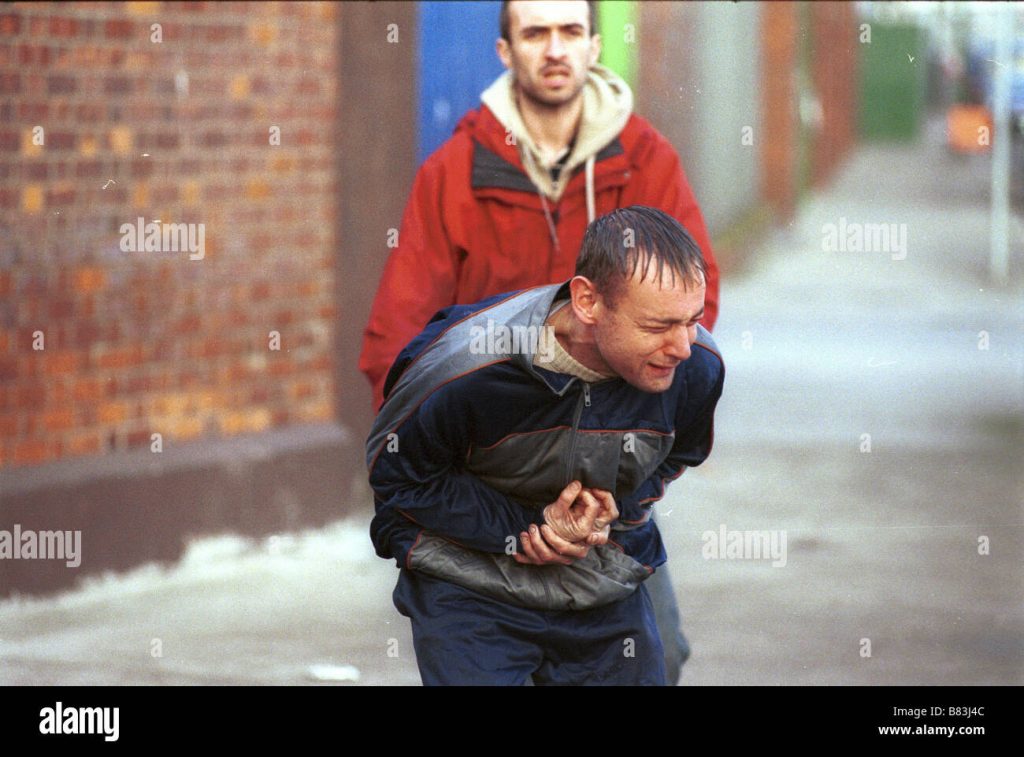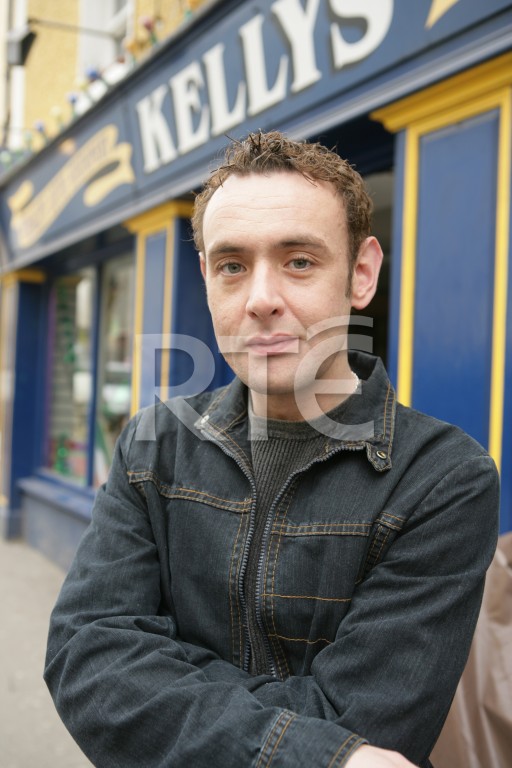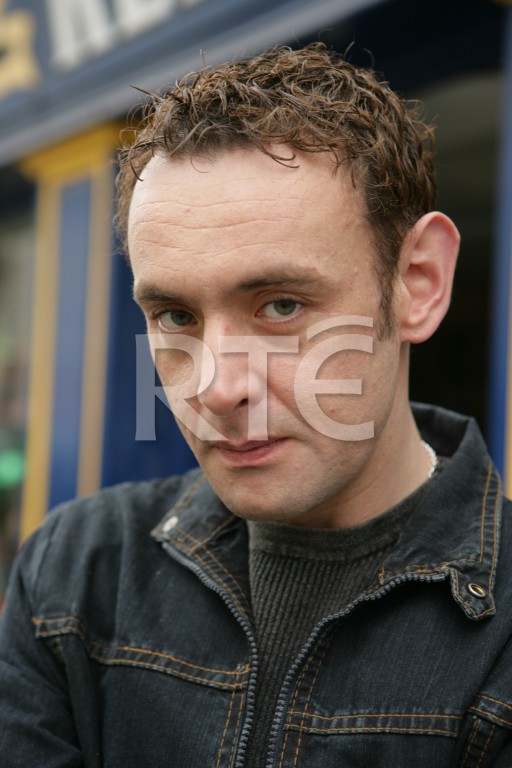


Tom Murphy was one of Ireland’s finest young actors before his untimely death at the age of 39 in 2007. He was born in Salisbury, Rhodesia (now Zimbabwe in 1968. He first came to public attenton with his brilliant performance as Ray in Martin McDonagh’s play “The Beauty Queen of Leenane” which was staged by the Druid Theatre in Galway, Dublin, London and then on to Broadway and Australia, winning several Tony Awards in New York. His films include “The General”, “Adam and Paul” in 2004 and “Small Engine Repair” in 2006.
“Playbill” obituary:
Tom Murphy, the Dublin-born actor who won a Tony Award playing a bored Irish teenager in Martin McDonagh’s The Beauty Queen of Leenane, died Oct. 6, 2007. He was 39 according to his friend, Kris Stone.
The cause was a quickly spreading lymphatic cancer, said Stone.
In McDonagh’s gorey domestic drama, Mr. Murphy lent comedy to the proceedings as the gangly, fidgety rural lad Ray Dooley, who unknowingly comes between the play’s three primary characters: the middle-aged, lovelorn Maureen; her interfering mother Mag; and her potential beau Pato. At one point, waiting to deliver a letter that will prove a major plot device, a frustrated Ray turned himself upside down in his chair, groaning with boredom over his chore.
“Mr. Murphy offers comic relief without ever presenting it as such,” wrote Ben Brantley in The New York Times. “His, more than any other character, must embody the provincial society beyond the women’s home, and Ray’s irritable restlessness is eloquent on the subject.” Mr. Murphy beat out his castmate Brian F. O’Byrne for the Tony.
A mid-sized man with short-cropped hair, large ears and an expressive face, Mr. Murphy’s film work included a lead role in the movie “Adam and Paul.” He also acted in “The Snapper,” “Michael Collins” and the television series “Pure Mule.”
According to BBC News, Marie Mullen, his co-star in Leenane, led a round of applause at the Oct. 6 curtain of Long Day’s Journey Into Night at the Gaiety Theatre. So did many other theatres in Dublin.
Emer O’Kelly’s obituary in “Independent.ie”:
UPDATED 25 NOVEMBER 2012 07:02
When local actors die it’s frequently said, “he could have made it big”. Tom certainly could have; 10 years ago, after he won a well-deserved Tony award on Broadway, pressure was brought to bear on him to move to Los Angeles. But Tom was at heart a stage actor, despite continuing success in high-quality, low-budget films, blockbusters weren’t his style, and the integrity of his acting was never diminished.
I first saw him on stage in 1996, and he was a revelation. It was the original opening night in Galway of Martin McDonagh’s The Beauty Queen of Leenane, and at that stage McDonagh was being hailed as Irish and, as people left the theatre, as “the new Synge”. I didn’t agree, but I had a lot to think about, much of it about the lugubriously hilarious performance of a new talent.
Tom Murphy was playing a bored and malevolent teenager, the deus ex machina of a plot which turns on an undelivered letter. The character, it seemed to me, was one of best flights in the play: bored to insanity in Leenane, the kid wants out, and he has high ambition. He wants to become a heroin-addicted drop-out in a Manchester squat. Tom could have hammed such outrageous comedy. Instead, he perched gnomically on a table edge, seeming to throw the lines away. He was 28 years old; he looked 15. Two years later he still looked 15 when he won a Tony award for the role.
He was also a haunting Johnny Boyle in Juno and the Paycock at the Abbey, his slight stature again a marvellous weapon, his nightmare meanderings as the one-armed, doomed target of an execution squad an echo and a precursor of the filthy work of today’s Sinn Fein inheritors of the Republican tradition. Tom’s performance, I suspect, would have won enthusiastic applause from O’Casey himself, who wrote his three great tragedies as an indictment of all nationalism, despite subsequent attempts to hijack them.
I only knew Tom Murphy very slightly but it felt as though I knew him well and fondly: anyone who spoke of him did so with deep affection and you immediately recognised that he was as liked as he was admired. “No side” was the universal judgement. Everybody liked him in a world where envy of the talent and acclaim of others can be rampant.
It is always a tragedy when somebody dies before their allotted time. For Tom Murphy, the cancer that took him rampaged through his compact little body like an all-consuming whirlwind. I hope that in his sadly short life he felt he had achieved at least some of his ambitions. He deserved that satisfaction and happiness: he was a wonderful talent and I am just glad that we saw at least some of it.
The above “Independent.ie” article can also be accessed online here.
Irish Independent tribute in 2007:
The actor Tom Murphy was only 39 when he died just over a week ago. It was far, far too young. But I hadn’t realised he was even that old: Tom was small and slight, and he had the chameleon face and body of the true actor. He could look like a kid on stage or screen, and frequently did. He could also look old and ravaged, as he did in his best-known role for film, that of a Dublin drug addict in Adam and Paul, in which he starred with his friend Mark O’Halloran, the pair directed by Lenny Abrahamson.
When local actors die it’s frequently said, “he could have made it big”. Tom certainly could have; 10 years ago, after he won a well-deserved Tony award on Broadway, pressure was brought to bear on him to move to Los Angeles. But Tom was at heart a stage actor, despite continuing success in high-quality, low-budget films, blockbusters weren’t his style, and the integrity of his acting was never diminished.
I first saw him on stage in 1996, and he was a revelation. It was the original opening night in Galway of Martin McDonagh’s The Beauty Queen of Leenane, and at that stage McDonagh was being hailed as Irish and, as people left the theatre, as “the new Synge”. I didn’t agree, but I had a lot to think about, much of it about the lugubriously hilarious performance of a new talent.
Tom Murphy was playing a bored and malevolent teenager, the deus ex machina of a plot which turns on an undelivered letter. The character, it seemed to me, was one of best flights in the play: bored to insanity in Leenane, the kid wants out, and he has high ambition. He wants to become a heroin-addicted drop-out in a Manchester squat. Tom could have hammed such outrageous comedy. Instead, he perched gnomically on a table edge, seeming to throw the lines away. He was 28 years old; he looked 15. Two years later he still looked 15 when he won a Tony award for the role.
He was also a haunting Johnny Boyle in Juno and the Paycock at the Abbey, his slight stature again a marvellous weapon, his nightmare meanderings as the one-armed, doomed target of an execution squad an echo and a precursor of the filthy work of today’s Sinn Fein inheritors of the Republican tradition. Tom’s performance, I suspect, would have won enthusiastic applause from O’Casey himself, who wrote his three great tragedies as an indictment of all nationalism, despite subsequent attempts to hijack them.
I only knew Tom Murphy very slightly but it felt as though I knew him well and fondly: anyone who spoke of him did so with deep affection and you immediately recognised that he was as liked as he was admired. “No side” was the universal judgement. Everybody liked him in a world where envy of the talent and acclaim of others can be rampant.
It is always a tragedy when somebody dies before their allotted time. For Tom Murphy, the cancer that took him rampaged through his compact little body like an all-consuming whirlwind. I hope that in his sadly short life he felt he had achieved at least some of his ambitions. He deserved that satisfaction and happiness: he was a wonderful talent and I am just glad that we saw at least some of it.










